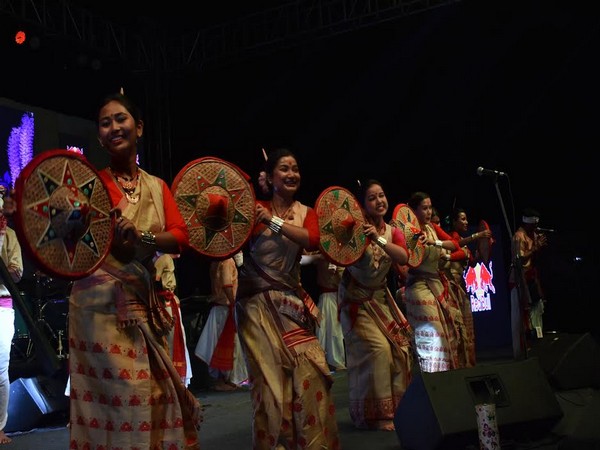New Delhi: All Assamese Student Association (AASA) organized the 10th edition of ‘Bohagi Utsav’ to celebrate the Assamese New Year at the premises of Indira Gandhi National Centre for Arts (IGNCA) here.
In Assam, Rongali or Bohag Bihu marks the arrival of spring. It is an important part of the cultures and is celebrated with great fervour. Thus, the Assamese diaspora scattered in different metropolitan cities left no stone unturned to celebrate the festival with utmost zeal and enthusiasm.
“People from the different cultural background are here so it shows our unity as a society and it is really keeping us connected to our roots since we are away from home and it is really a good platform to showcase our talent and stay connected to our roots,” Violina Kalita told ANI.
“I think this is the way to reach people’s heart. It is a great way to make people aware of our culture and our society and how we work together. I think with every successive year, it is going to go bigger and better,” she added.
Traditional folk dance and songs reflecting the advent of spring were some of the major highlights that left the audience awestruck. Donned in red motif, traditional two pieces ‘muga’ mekhela chador, a group of young boys and girls grooved to the beats of ‘dhol’ and ‘pepa’ (Assamese traditional instruments) and performed the widely known, Bihu folk dance.
“It feels really happy to see this in a big stage; we have been celebrating Bihu since 2009 and bringing the people from Delhi NCR and other parts together under one platform. I am thankful to all those who have supported us,” Abhilash Borah, a member of AASA told ANI.
Later, the event saw a performance by renowned Bollywood singer Zubeen Garg. He sang some of the popular Assamese and Bollywood hits.
On a similar note, an interesting fusion of cultural celebration was witnessed in Noida’s Capetown Supertech. Several people came together to take part in the celebration of ‘Rongali Bihu’ and ‘Poila Boisakh.’
“We are feeling very good that we are sharing the culture not only with the Bengali’s but with other cultures also. And another reason is that our children, who are the coming generation. who missed to see this is getting a chance to know a little bit of ‘Bihu’ as well as ‘Poila Boisakh,'” Pranamita, a resident of Noida said.
Celebrating the advent of spring in various forms is prevalent among all communities across the world.
[source_without_link]ANI[/source_without_link]

